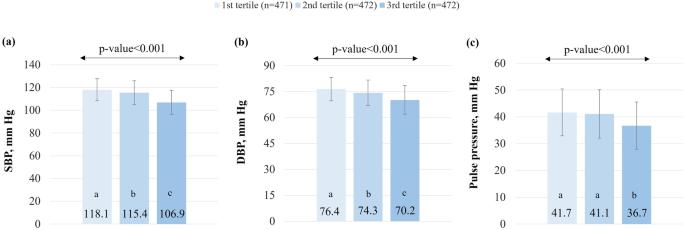坚持地中海饮食与 20 年高血压发病率:ATTICA 前瞻性流行病学研究(2002-2022 年)
IF 3.6
3区 医学
Q2 NUTRITION & DIETETICS
引用次数: 0
摘要
背景/目的饮食习惯是高血压(HTN)的重要预测因素。我们的目的是评估坚持地中海饮食与高血压发病率之间的长期关系。这是一项前瞻性研究,对 1415 名非高血压成年人(44% 为男性,年龄:41 ± 13 岁)进行了长达 20 年的随访。在基线时对人体测量、生活方式和临床参数进行了评估。通过地中海饮食评分(MedDietScore)(范围:0-55,数值越高表示越坚持)对基线和 10 年的地中海饮食坚持情况进行了评估。在基线 MedDietScore 的最低、中间和最高三分位数中,高血压发病率分别为 35.5%、22.5% 和 8.7%(p < 0.001)。基线 MedDietScore 每增加 1 分,20 年高血压风险降低 7% [相对风险 (RR):0.925,95% 置信区间 (CI):0.906, 0.943]、在对年龄、性别、基线生活方式和临床混杂因素(即体重指数、体力活动、吸烟、收缩压和舒张压、高血压家族史、高胆固醇血症和糖尿病)进行调整后,这一影响仍然显著(RR:0.973,95%CI:0.949,0.997)。在类似的多重调整模型中,与持续偏离地中海饮食的受试者(在基线和 10 年内均处于 MedDietScore 最低三分位)相比,只有持续接近地中海饮食的受试者(在基线和 10 年内均处于 MedDietScore 中上三分位)20 年高血压风险降低了 47%。本文章由计算机程序翻译,如有差异,请以英文原文为准。


Adherence to the Mediterranean diet and 20-year incidence of hypertension: the ATTICA prospective epidemiological study (2002–2022)
Dietary habits are a significant predictor of hypertension (HTN). We aimed to evaluate the long-term association between adherence to the Mediterranean diet and HTN incidence. This was a prospective study among 1415 non-hypertensive adults (44% men, age: 41 ± 13 years) followed up for 20 years. Anthropometric, lifestyle, and clinical parameters were evaluated at baseline. Adherence to the Mediterranean diet was evaluated both at baseline and 10 years through the MedDietScore (range: 0–55, higher values indicate greater adherence). At the 20-year follow-up, 314 new HTN cases were recorded. HTN incidence was 35.5%, 22.5%, and 8.7% in the lowest, middle, and upper tertile of baseline MedDietScore, respectively (p < 0.001). For each 1-point increase in baseline MedDietScore, the 20-year HTN risk decreased by 7% [relative risk (RR): 0.925, 95% confidence interval (CI): 0.906, 0.943], and this effect remained significant after adjustment for age, sex, and baseline lifestyle and clinical confounders, i.e., body mass index, physical activity, smoking, systolic and diastolic blood pressure, family history of HTN, and presence of hypercholesterolemia and diabetes mellitus (RR: 0.973, 95%CI: 0.949, 0.997). In a similar multiadjusted model, compared to subjects who were consistently away from the Mediterranean diet (in the lowest MedDietScore tertile both at baseline and 10 years), only those who were consistently close (in the middle and upper MedDietScore tertiles both at baseline and 10 years) exhibited a 47% lower 20-year HTN risk. A high adherence to the Mediterranean diet, particularly when longitudinally sustained, is associated with lower incidence of HTN.
求助全文
通过发布文献求助,成功后即可免费获取论文全文。
去求助
来源期刊
CiteScore
10.60
自引率
2.10%
发文量
189
审稿时长
3-6 weeks
期刊介绍:
The European Journal of Clinical Nutrition (EJCN) is an international, peer-reviewed journal covering all aspects of human and clinical nutrition. The journal welcomes original research, reviews, case reports and brief communications based on clinical, metabolic and epidemiological studies that describe methodologies, mechanisms, associations and benefits of nutritional interventions for clinical disease and health promotion.
Topics of interest include but are not limited to:
Nutrition and Health (including climate and ecological aspects)
Metabolism & Metabolomics
Genomics and personalized strategies in nutrition
Nutrition during the early life cycle
Health issues and nutrition in the elderly
Phenotyping in clinical nutrition
Nutrition in acute and chronic diseases
The double burden of ''malnutrition'': Under-nutrition and Obesity
Prevention of Non Communicable Diseases (NCD)

 求助内容:
求助内容: 应助结果提醒方式:
应助结果提醒方式:


